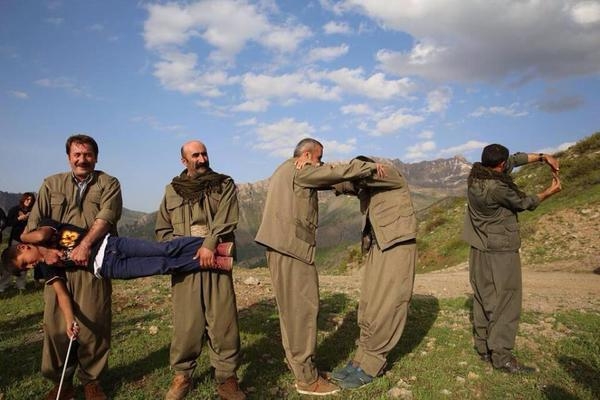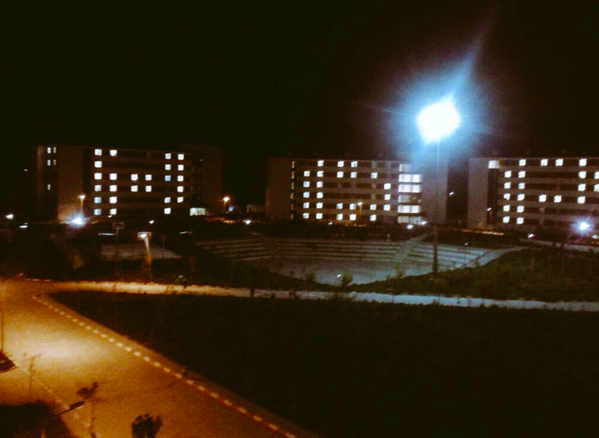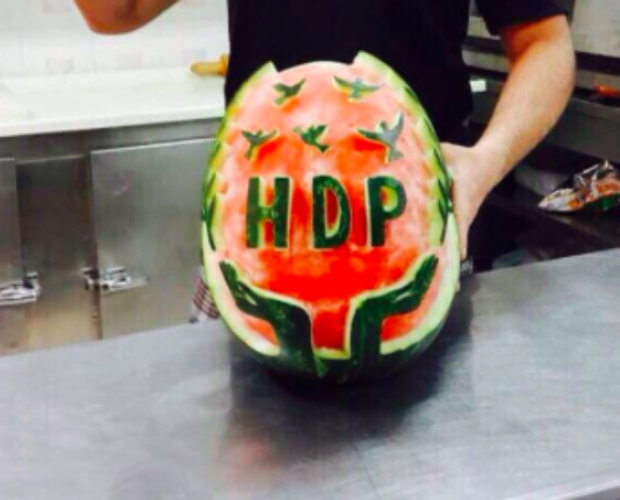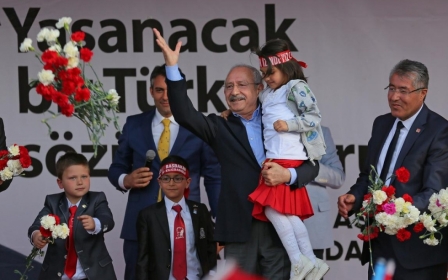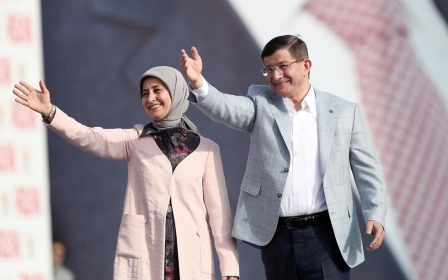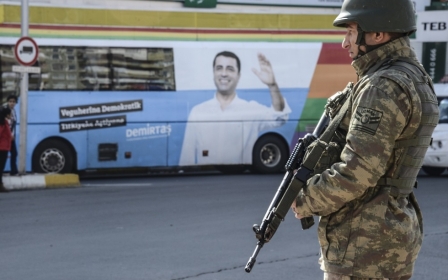Kurdish political party launches colourful election campaign in Turkey
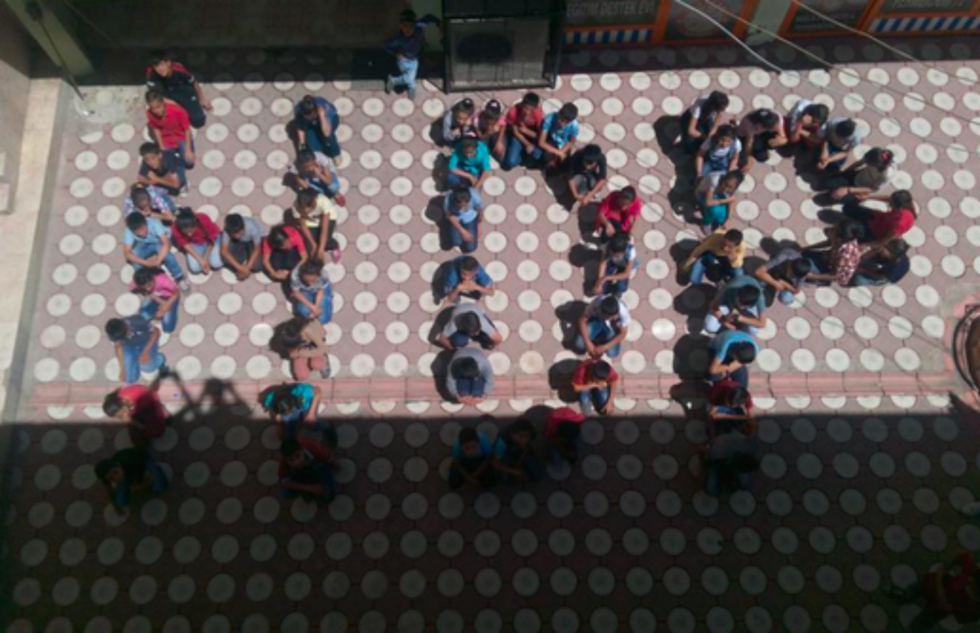
Watermelons. Cigarettes. Pizzas. Hotel rooms. Guerilla fighters. These are just a few of the objects (and people) who have been involved in a colourful campaign for Turkey's Peoples' Democratic Party (HDP) to draw support in anticipation of the country's elections on 7 June.
In a grassroots campaign, supporters of the HDP from around Turkey have taken to Twitter posing with a wide array of objects forming the initials of the party, to show their support for a political party rapidly taking on the status of kingmakers in Turkey.
Though thought of as a pro-Kurdish political party – overwhelmingly drawing support from Turkey's Kurdish majority regions, but also popular in parts of Istanbul – the party has moulded itself as a party for all Turkey's minorities, including Alevis, Ismailis, Greeks, Jews and Armenians.
Politically left-wing and secular, they have been critical of both the religiously conservative government of the Justice and Development Party (AKP) and the nationalism of the leading opposition Republican People's Party (CHP), which has been historically hostile to Kurdish aspirations.
The HDP originally grew out of an earlier party, the Democratic Society Party (DTP), which was controversially banned in 2009 as it was found to violate Articles 68 and 69 of the constitution and the Political Parties Law, threatening the "indivisible unity of the state, the country and the nation" due to its Kurdish nationalist aspirations and its alleged links to the outlawed Kurdistan Workers Party (PKK).
The party has also prided itself on its socially liberal policies – it maintains a 50 percent quota of female parliamentary candidates and has promoted feminist policies, promising the creation of a national ministry for women. It has also promised to create a ministry for the youth and to lower the voting age to 16.
It has also set a 10 percent LGBT (Lesbian, Gay, Bisexual and Transgender) quota for candidates as well. The HDP have been ubiquitous at Istanbul's annual Pride marches – the largest in the Middle East – and the party has called for the introduction of legal protections for LGBT people in Turkey.
Speaking at Mazgirt Bridge in the eastern Tunceli province (the only province with a majority belonging to the Alevi Shiite sect) last week, the charismatic HDP co-president Selahattin Demirtas told supporters that his party would aim to bridge sectarian divisions.
“The AKP and the others wish to maintain the old system and are seeking new assaults," he said. "Beliefs have been banned for hundreds of years. Alevis, Sunnis and Yazidis have been incited against each other. One sect is given prominence over the others and hostility has been encouraged. We have to oppose this. We have to unite to demolish the reactionary system imposed on us and create a world in which everyone can live."
"The forces united under the HDP umbrella will succeed."
But the party is ultimately coloured by its origins in the Kurdish rights movement and its links to the PKK.
Though the party has maintained that it operates independently of the PKK leadership, the HDP's associations with the PKK institutions – such as the transnational democratic body the Koma Civakên Kurdistan (KCK) – are clear.
In a statement from prison in October 2013, PKK leader Abdullah Ocalan said the HDP would continue the “historical legacy of revolutionary struggle”.
“The HDP marks an important stage in our common struggle for democracy,” it read. “The experience of our struggle will evolve into democracy.”
Many have seen the development of the HDP as a crucial factor in the PKK's public disavowal of violence and guerilla warfare and the pursuit of a non-violent path to Kurdish national aspirations.
The PKK's war with the Turkish state cost over 40,000 lives - mostly Kurdish - and resulted in widespread destruction of Kurdish villages. Historically, the Turkish government banned the Kurdish language and all expressions of Kurdish national identity.
The Turkish Republic created by Mustafa Kemal Ataturk in 1923 did not recognise the existence of Turkey's Kurdish minority, enforcing cultural assimilation under the banner of Ataturk's famous adage, "Happy is he who calls himself a Turk."
But the coming to power of the AKP in the 21st century led to a loosening of restrictions of Kurdish identity and introduced the optional Kurdish language classes in schools and Kurdish-language TV channels. It also began negotiations with the PKK to end the guerilla conflict which had been ongoing since 1984.
For this reason it is the AKP with whom the HDP primarily jostles for votes - many Kurds, particularly conservative and religious voters, see the AKP as having finally allowed Kurds to break the glass ceiling and embrace their heritage, while also providing economic growth and opportunities.
They also see the rise in popularity of the right-wing Nationalist Movement Party (MHP) - currently polling third just above the HDP - as a sign that their hard-won gains can easily be taken away. The MHP is intensely hostile to the PKK peace process and opposes concessions to Kurdish rights activists. Its ultra-nationalist paramilitary wing, the Grey Wolves, has been responsible for hundreds of attacks on left-wing and Kurdish activists since the 1970s.
The party's main ambition in the coming election, however, will simply be to enter to the parliament and have a voice - as well as crucially scuppering controversial constitutional changes planned by the AKP.
"If the HDP passes the 10 percent threshold, which would require about 4.5 million votes, the ruling Justice and Development Party (AKP) will not achieve the majority it needs to directly push through Erdoğan’s controversial plan to introduce a presidential system in Turkey, which would grant him unparalleled executive authority," wrote Alev Scott, author of Turkish Awakening, writing for Politico.eu.
"While the AKP looks set to win its fourth election with Erdogan’s very thinly-veiled support, many voters are increasingly disillusioned with the party’s 13-year rule. While the HDP’s support for Kurdish rights alienates nationalist Turks, who cannot accept the party’s connection to the outlawed Kurdish separatist group the PKK, in recent months the HDP’s insistence on democratic pluralism and equal rights - not just for Kurds but for all citizens of Turkey – has borne fruit."
Middle East Eye propose une couverture et une analyse indépendantes et incomparables du Moyen-Orient, de l’Afrique du Nord et d’autres régions du monde. Pour en savoir plus sur la reprise de ce contenu et les frais qui s’appliquent, veuillez remplir ce formulaire [en anglais]. Pour en savoir plus sur MEE, cliquez ici [en anglais].






